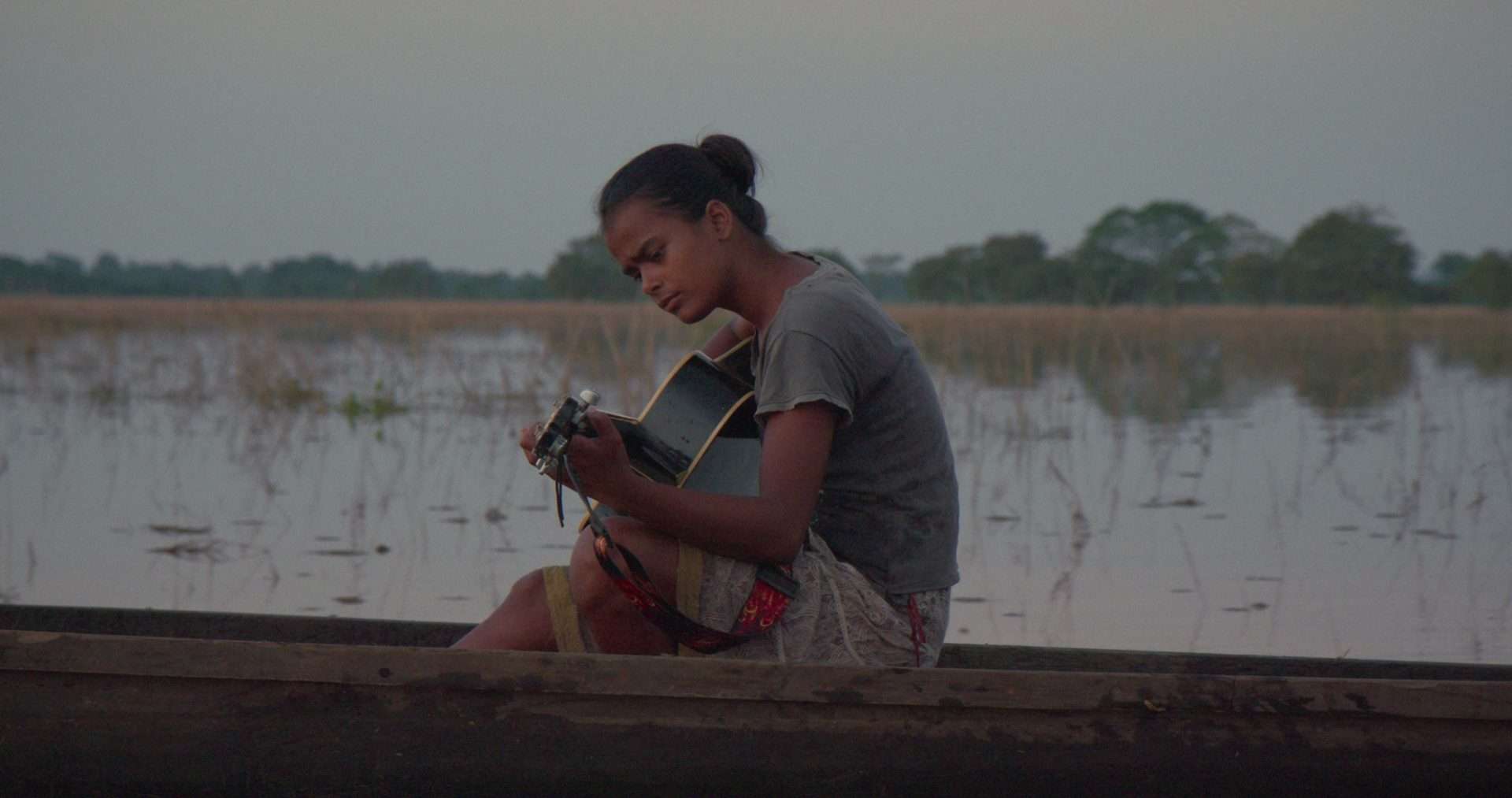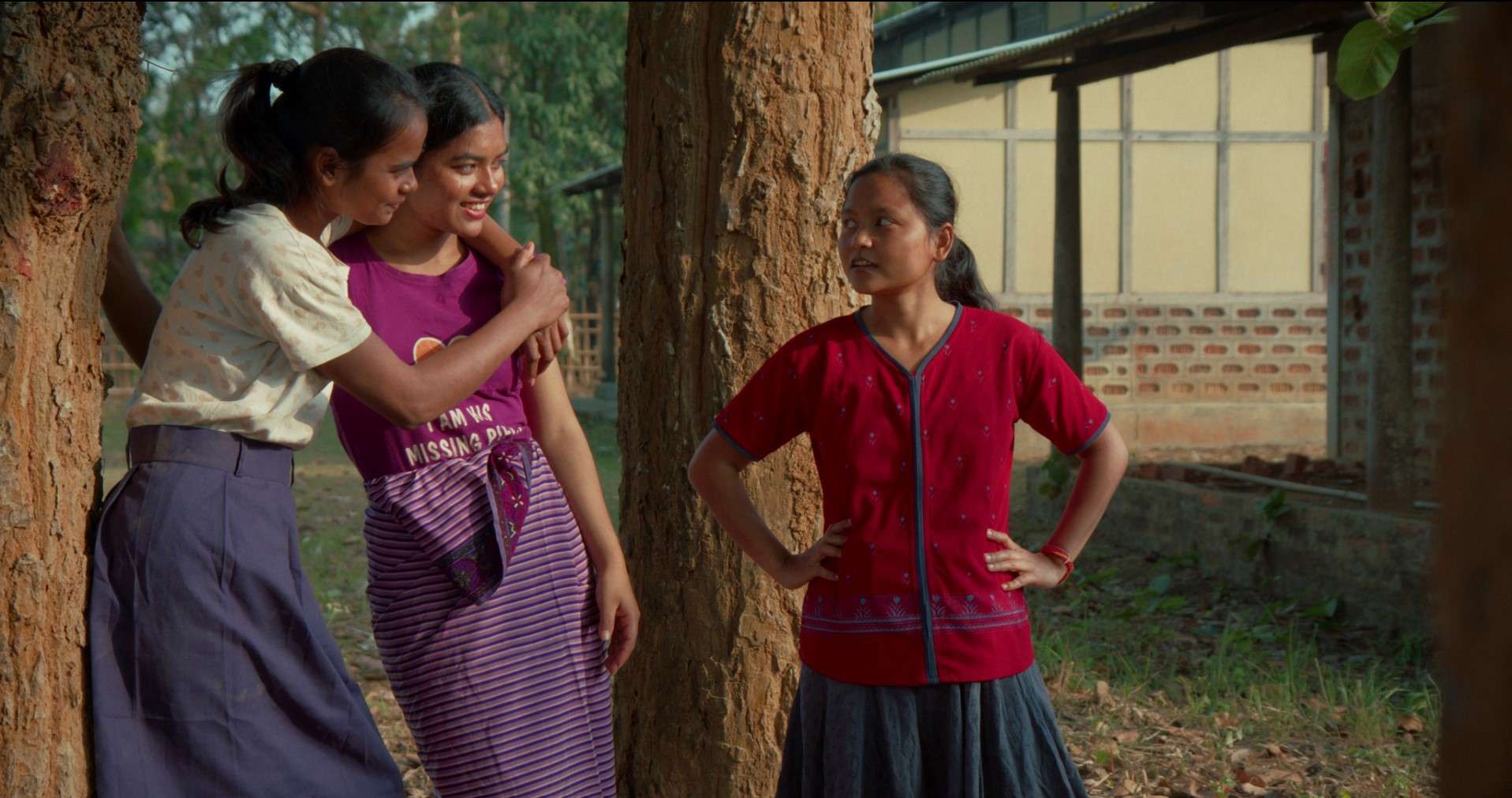It’s not always that sequels are so greatly adored in film festivals, but “Village Rockstars 2” (2024) by Rima Das comes as that special film which not only had its world premiere at the Busan International Film Festival 2024 but also won the celebrated Kim Jiseok Award at the same festival. Recently, it also had its European premiere at the Berlin International Film Festival 2025, and in between it was also screened at MAMI (Mumbai Film Festival) 2024, Dharamshala International Film Festival 2024, International Film Festival of Kerala 2024, and Pune International Film Festival 2025.
The first thing “Village Rockstars 2” does successfully is shake off the negative presumption that injudiciously forms a certain kind of discriminatory approach towards film sequels. Even while extending the storyline, “Village Rockstars 2” maintains its independent stature and retains its artistic integrity to continue the story of Dhunu, seven years after the events of the first film.
Dhunu (Bhanita Das) is currently in her late teens and is experiencing both the beauty and the rough edges of growing up. By now, filmmaker Rima Das has achieved remarkable expertise in handling teenage characters with which she has already defined the soul of her previous films. In “Village Rockstars 2,” she treats the character of Dhunu with varying degrees of tenderness while also equally challenging her with bold and demanding situations in life. Dhunu is definitely in the lap of nature and appreciates life’s slow and leisurely pace. Still, at the same time, she carries the weight of immense responsibilities for survival on her shoulders.
As a young girl, she assumes the majority of the household responsibilities as her brother remains largely absent. Meanwhile, he is entertained by desires that are directly in conflict with the values of their small and struggling family. Amidst all this, Dhunu has her guitar and performs in small functions in and around her village. Then there’s the occasional girl talks with her friends and yes, some sweet admiration of opposites and a few treasured conversations in between. It’s almost heartbreaking to see such innocence go through a sea of change as Dhunu embraces one challenge after another. Das, who has also written the film, establishes the stakes first which allows her to explore the innocence and the beauty of village life. Then she brings up the conflict which relates itself to Dhunu and her family in the capacity of a world to lose.

Among the challenges, there’s a rebel brother, the failing health of Dhunu’s mother, and a sub-plot related to coercive land sales as brokers eye their ancestral land for starting development projects. There’s also the consistently inconsistent utilization of seasons that mirror the changing moods of time. A tragedy occurs in the rain which brings out the ultimate helplessness of Dhunu as she faces an unimaginable loss. In this regard, “Village Rockstars 2” is emotionally evoking and also politically conscious of its position. It is direct in its statement-making as it situates the dire state of rural infrastructure and accessibility to basic needs, along with the overall environmental consciousness that operates on the sideline of the main plot. Dhunu’s mother herself draws a parallel between her own struggles and those of their land – both, in essence, are nurturing mothers.
Rima Das positively exploits the natural greenery and the scenery of her place which almost inspires wanderlust. The beautiful kohuwa (wild sugarcane), the rainbow, the red and pink hues of an evening sky, the clear water, and the fresh green crops are all showcased with an enhanced vision of color which makes nature appear even more beautiful on screen. It brings immediate visual pleasure and an appreciation for the untainted glory of nature.
Also Related: 10 Essential Award-Winning Assamese Movies Of The Decade (2010s)
This beauty of nature is later leveraged when bulldozers ravage through cultivation land and big trees fall to the ground. Dhunu observes everything from an intimate distance. For a girl who finds solace in the embrace of nature, there’s none better to understand its suffering. The theme of how Dhunu identifies with nature or how nature is within her and how it relates to her mother is a conscious choice that the filmmaker tackles to highlight the connection between human beings and nature.

Filmmaker Rima Das has also previously criticized the Assam government’s decision to fell thousands of trees along NH 17 for the construction of four lanes. It’s only fitting that her voice of protest comes out in her film as well. Such themes of activism also tie “Village Rockstars 2” to the broader roots of eco-feminism in the first film. A dialogue between Dhunu and her friend also notes the interdependence – “You’re my friend, I am yours. I am your friend, you’re mine”. It can be applied to the case of the mutual coexistence between human beings and the environment as well. In fact, the eco-critical aspirations are stronger in the sequel than in “Village Rockstars” (2017). To note, there’s also a brief cameo by nature conservationist and researcher Purnima Devi Barman in the film.
There also exists the contrast of themes and the sharp cuts – from noise to silence – a characteristic treatment of editing in Rima Das films. Likewise, Dhunu defies gender norms but a bit of gender discrimination also feels forced in this one. Especially when the mother says, “Women are women’s real enemies”. Meanwhile, the flood, which destroys crops, is a recurring element in “Village Rockstars 2” which is not only a narrative turn but also a real environmental concern. The style of visuals in “Village Rockstars 2” is very much dictated by Rima Das’s auteurist aesthetic appeal and so are the introspections, the raw humor, the mood building, and the colloquial dialogue delivery of the characters.
“Village Rockstars 2” captures the rawness of the heart and soul of its protagonist as Rima Das’s filmmaking treats the narrative as more of an inward-looking journey of grief, self-reflection, and resilience. There are also occasional intercuts of Dhunu remembering moments from the first film. In fact, “Village Rockstars 2” is a technically upgraded and emotionally more profound narrative (in comparison to the first film) that tells a real, relatable, and easily accessible coming-of-age story with a sincere emotional appeal. Its independent nature and artistic focus do not result in any injustice for the film; in other words, it doesn’t hinder the mainstream potential of the film.
Also, special mention should be made about the creative use of music (in one scene, the children play guitar and folk musical instruments together) and the beautiful score by Pallab Talukdar. Meanwhile, filmmakers from Assam can observe the poster for “Village Rockstars 2” and learn a bit or two about designing or visualizing a better poster for their own films. With cinematography, production design, and editing by Rima Das, “Village Rockstars 2” is jointly produced by Rima Das with Fran Borgia, Jaya Das, Yao Chen, and Cao Yu as co-producers. The key cast of the film includes Bhanita Das, Basanti Das, Junumoni Boro, Boloram Das, Manabendra Das, Bhaskar Das, and Bishnu Kalita. The film will soon be released theatrically in Assam and parts of India.


![South Park: Bigger, Longer and Uncut [1999] Review – Still Relevant](http://www.highonfilms.com/wp-content/uploads/2020/04/south-park-768x432.jpg)
![The Legend of La Llorona [2022] Review: An Unimpressive Retelling of the Mexican Myth of “The Weeping Woman”](http://www.highonfilms.com/wp-content/uploads/2022/01/THE-LEGEND-OF-LA-LLORONA-1-768x512.jpg)


